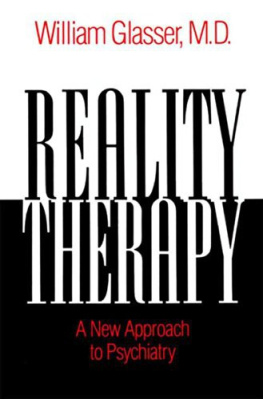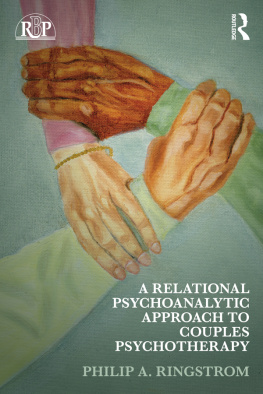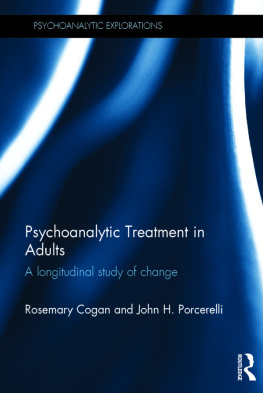REALITY
THERAPY
A NEW APPROACH TO PSYCHIATRY
by
WILLIAM GLASSER M.D.
With a Foreword by O. H. MOWRER, Ph. D.

To G. L. Harrington, M.D.
This is an extraordinarily significant book. Readers will themselves discover that it is courageous, unconventional, and challenging. And future developments will, I predict, show that it is also scientifically and humanly sound.
For more than a decade now, it has been evident that something is seriously amiss in contemporary psychiatry and clinical psychology. Under the sway of Freudian psychoanalysis, these disciplines have not validated themselves either diagnostically or therapeutically. Their practitioners, as persons, have not manifested any exceptional grasp on the virtues and strengths they purportedly help others to acquire. And the impact of their philosophy of life and conception of man in society as a whole has been subtly subversive.
Because they were the main losers, laymen were the first to become vocal in their discontent, distrust, and cynicism. But today there is a shaking of the foundations in professional circles as well. For example, a state hospital superintendent recently said to me: Yes, we too think we have a good hospital here. At least we arent doing the patients any harm. And thats progress. In the past, we psychiatrists have often spread the disease we were supposedly treating.
Late in his training as a psychiatric resident, Dr. Glasser saw the futility of classical psychoanalytic procedures and began to experiment with a very different therapeutic approach, which he eventually named Reality Therapy. Rather than a mere , six postulates are listed as characterizing most forms of professional psychotherapy now practiced in the United States and Canada, ranging from simple counseling through nondirective therapy to orthodox psychoanalysis. These six postulates or presuppositions are: the reality of mental illness, reconstructive exploration of the patients past, transference, an unconscious which must be plumbed, interpretation rather than evaluation of behavior, and change through insight and permissiveness. The extent of Dr. Glassers break with this total tradition is indicated by the following simple but bold statement: Reality Therapy, in both theory and practice, challenges the validity of each of these basic beliefs. Moreover, Dr. Glasser states that the conventional therapist is taught to remain as impersonal and objective as possible and not to become involved with the patient as a separate and important person in a patients life. In Reality Therapy, the helping person becomes both involved with and very real to the patient in a way which would be regarded as utterly destructive of the transference as conceived and cultivated in classical analysis.
More concretely and positively, what then is Reality Therapy? answers this question, in concise and nontechnical language; and Chapters 3 to 6 exemplify the approach as it has been applied in various contexts. In essence, it depends upon what might be called a psychiatric version of the three Rs, namely, reality, responsibility, and right-and-wrong.
Dr. Glasser begins at the end of this formula and asks, early in : What is wrong with those who need psychiatric treatment? The answer is that they have not been satisfying their needs. Here it might appear that Reality Therapy and psychoanalysis have something in common, but not so. For Freud, the needs which are presumably unfulfilled, in the so-called neurotic, are those of sex and aggression. For Glasser the basic human needs are for relatedness and respect. And how does one satisfy these needs? By doing what is realistic, responsible, right.
Granted that it is not always clear precisely what is right and what is wrong, Dr. Glasser nevertheless holds that the ethical issue cannot be ignored. He says:
To be worthwhile we must maintain a satisfactory standard of behavior. To do so we must learn to correct ourselves when we do wrong and to credit ourselves when we do right. If we do not evaluate our own behavior or, having evaluated it, if we do not act to improve our conduct where it is below our standards, we will not fulfill our needs to be worthwhile and will suffer as acutely as when we fail to love or be loved. Morals, standards, values, or right and wrong behavior are all intimately related to the fulfillment of our needs for self-worth and [are] a necessary part of Reality Therapy.
Conventional psychiatry and clinical psychology assume that neurosis arises because the afflicted individuals moral standards are unrealistically high, that he has not been bad but too good, and that the therapeutic task is, specifically, to counteract and neutralize conscience, soften the demands of a presumably too severe superego, and thus free the person from inhibitions and blocks which stand in the way of normal gratification of his instincts. The purview of Reality Therapy is, again, very different, namely, that human beings get into emotional binds, not because their standards are too high, but because their performance has been, and is, too low. As Walter Huston Clark has neatly put it, the objective of this (radically non-Freudian) type of therapy is not to lower the aim, but to increase the accomplishment. Freud held that psychological disorders arise when there has been a cultural interference with the instinctual, biological needs of the individual, whereas Glasser and others are now holding that the problem is rather an incapacity or failure at the interpersonal, social level of human functioning.
This categorical reversal of both the theory of neurosis and the intent of psychotherapy has far-flung implications. Freudian therapists and theorists concede, of course, that not everyone suffers from over-development of the superego. At least certain kinds of delinquents and criminals, they admit, have too little rather than too much conscience; and in the case of the very young and inexperienced, their problem is similarly a deficit of character rather than a presumed excess. Thus, in the psychoanalytic frame of reference, two types of therapy are called for, the one essentially educative, the other re-educative or corrective in the sense of undoing the effects of past efforts at socialization which have presumably been too successful. Dr. Glassers view of the matter is quite different. He assumes that so-called neurotic and psychotic persons also suffer (although not so severely as do delinquents and frank sociopaths) from character and conduct deficiencies; and if this be the case, then all therapy is in one direction, that is, toward greater maturity, conscientiousness, responsibility. Glasser says:
Using Reality Therapy, there is no essential difference in the treatment of various psychiatric problems. As will be explained in later chapters, the treatment of psychotic veterans is almost exactly the same as the treatment of delinquent adolescent girls. The particular manifestation of irresponsibility (the diagnosis) has little relationship to the treatment. From our standpoint, all that needs to be diagnosed, no matter with what behavior he expresses it, is whether the patient is suffering from irresponsibility or from an organic illness.
Next page










